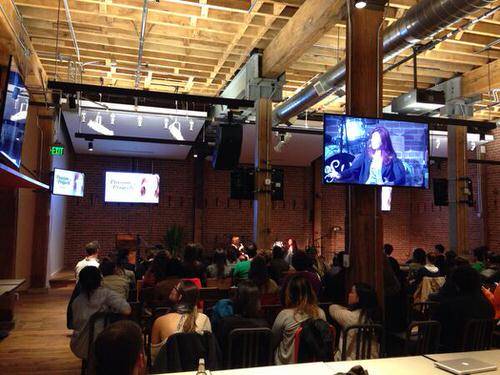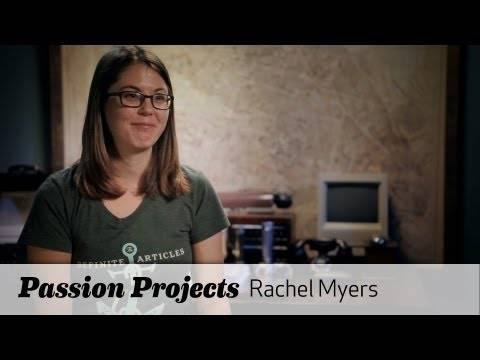Silicon Valley certainly talks a lot about the dearth of women in technology, but relatively few companies seem to do much about it. Here’s one surprising exception: GitHub, the open-source collaboration site for software developers.
GitHub’s atypical experience with diversity owes a fair deal to an unlikely source—a humble lecture series called “Passion Projects” that features female technologists talking about the work that energizes them. As it turns out, by giving women in technology the spotlight, GitHub has also apparently demonstrated that it’s a great place for women to work.
CEO Tom Preston-Werner said that Passion Projects has had a real effect on recruiting. Over the last six months, a quarter of GitHub’s most recent 60 hires have been women, he said. Some hires wouldn’t have happened without Passion Projects. For example, the company hired Rubyist Rachel Myers shortly after her own Passion Projects talk.
It’s not just about the lectures themselves. Passion Projects is about showing the world that GitHub has made hiring women in technology a priority in a very public way. And women have noticed.
For Women, By Women

Once a month, about a hundred people crowd into GitHub’s San Francisco headquarters to hear a notable woman in technology talk on a topic of her choice. The talks are so popular that organizers recently bumped up the attendance cap and started putting them on the Passion Projects YouTube channel.
Passion Projects isn’t just the first female-focused talk series at GitHub—it’s the only talk series at GitHub. Its founder, Julie Ann Horvath, credits GitHub’s self-starter environment with helping her hatch the idea of doing something proactive to combat sexism in the tech industry, instead of just reacting to the latest incident of tech men behaving badly.
Horvath plotted quietly at first, waiting for the best time to pitch the idea to CEO Tom Preston-Werner. Her moment came last year at GitHub’s internal conference.
“Tom had just gotten up and talked about how important it was for GitHub to hire women developers,” she said. “I thought it was the perfect time to bring up Passion Projects, so I got up right after him and pitched it. I kind of put him on the spot, and I hope he’s forgiven me.”
Preston-Werner is a staunch advocate of the project, but Horvath says his greatest contribution was letting her run it.
“Tom hasn’t been super involved with the series, almost intentionally,” she said. “I’m always put off by women-in-technology initiatives put together by men. It’s not very sincere. I intentionally made [Passion Projects] a thing that is explicitly worked on by women at this company, and that is female driven in general.”
Passion Projects doesn’t just amplify the voices of women in technology. It also puts women in business. It takes a lot of work to put on the event, and Horvath makes sure that the people she recruits to help are women.
“I definitely go out and find women really prolific in the open source community,” she said. “The photographers I hire? All women. I worked with [letterer] Jessica Hische on the logo design. It’s a really cool thing to literally create jobs for women in this industry.”

She’s also just recruited GitHub’s first ever female intern to help run the series. And that’s just the tip of the iceberg.
“This time last year there were only three women our technical/product teams, including myself,” said Horvath. “Now there are 11. I personally sought out and advocated for a few of our new female hires, not that I needed to because they’re badass.”
Preston-Werner said that by prioritizing diversity in GitHub’s activities, there’s a better chance the company will find the right people.
“For me, it’s really about being able to find the right candidates,” he said. “And filling the top of your pipe with a broadly diverse group of people. Because if you do that, and you run the through the hiring process, then you’ll end up with a diverse group of candidates at the end of the day. And because of the way the tech industry is, with existing demographics, this takes work.”
Is Recruiting Women Sexist?
GitHub is one of many tech companies aiming to make itself more appealing to female developers and other technologies. Aside from Passion Projects, the company sponsored 30 different initiatives to support women in tech in 2013. The company also prides itself on a family-friendly work environment, complete with a large play area. This isn’t aimed just at moms, but also at dads like Preston-Werner.
Still, Horvath says she struggles against the idea that Passion Projects is somehow turning women into token hires employed less for their own merit than for company diversity. Engineer and Web designer Lea Verou, for instance, last year wrote a lengthy blog post criticizing most “women in technology” initiatives as “actually doing more harm than good to women in tech,” though she didn’t specifically mention GitHub or Passion Projects. Verou didn’t reply to an email seeking comment.
For Horvath, it’s all about the reasons companies are recruiting women in the first place. Is it because they think it’s important to have varying perspectives and level the playing field? That’s exactly Horvath’s intent in recruiting women to work on Passion Projects.
“[I] try to even the playing field for women and for people who come from different socio-economic classes, and belong to different races and ethnicities,” she wrote in an October blog post. “But not because someone told me those are things I should care about, but because that’s who I am. And I’d like to make it easier for more people like me to learn, succeed, and become leaders in tech.”
But companies hiring women just to say they have them? That’s sexist.
“I think a lot of companies talk about [diversity] because they think they’re supposed to, not because they want to,” she said. “They hire women and put them on a shelf and say, ‘Look at our women!’ just to say they have women employees.”
Horvath says the majority of criticism that Passion Projects receives touches on this point, that it’s sexist to focus so much on women. Horvath says she’s also been accused of not working hard enough to invite racially diverse women. Ironically, Horvath is biracial herself.
“People have such a reaction to strong women in this industry,” she said. “They want you to get caught up in the crazy drama. But the way we’re going to get more women in technology is just to have women doing their jobs well. Women will say, ‘I can do this because she’s doing it.’”
If Horvath needs any encouragement that she’s on the right track, she doesn’t have to look very far. Even at GitHub, which is especially diverse for the field, managers say things that are very telling about the industry. She says: “I recently got an email from a middle manager that began ‘So Julie, how are the women at GitHub?’ I said, ‘You should ask them’.”
Horvath has done a lot of hard work for the women of GitHub and in the tech industry in general. But as Passion Projects continues to attract a larger number of women to GitHub, Horvath’s is just one woman’s voice out of many.
“I’m not a figurehead for the women at GitHub,” she said. “ I’m just here to empower.”
Lead image courtesy of Julie Ann Horvath

















